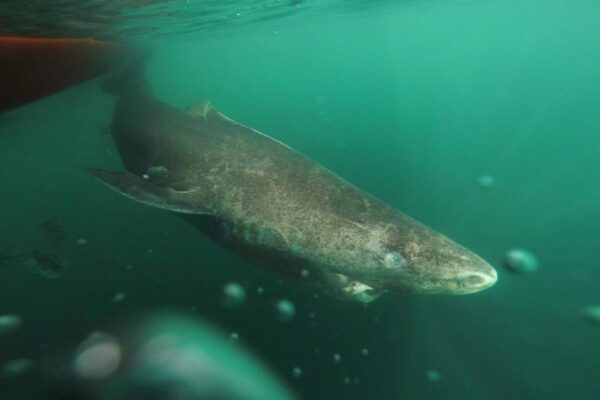The mysterious Greenland shark – thought to have the longest lifespan of any vertebrate – has been granted new, historic protections by the Northwest Atlantic Fisheries Organization (NAFO). The US and Canada, with support from the UK and the EU, proposed and secured a science-based ban on retaining the species from international waters.
Greenland sharks are known to be the longest-living vertebrate in the world, reaching ages of between 270 and 500 years. Scientists have estimated that Greenland sharks can live 400 years and don’t reproduce until about age 150, leaving populations exceptionally susceptible to overfishing. (photo: Julius Nielsen/Mongabay)
Now, the Northwest Atlantic Fisheries Organization (NAFO), an intergovernmental organization that manages fisheries, has moved to protect the shark. This ban would apply to the intentional catching of Greenland sharks as well as the retention of the species as bycatch.
Long awaited protection
A year ago, in September 2021, the long-lived shark was denied protection following a series of negotiations
Then the US had proposed a science-based ban on retaining Greenland sharks and was supported by the EU, UK, Canada, Russia and Norway. However, in response to opposition from Iceland, the US withdrew its proposal. The NAFO Parties supporting Greenland shark protection pledged to reintroduce the proposal at the next annual meeting.
Greenland sharks are associated with the high latitudes of the North Atlantic and Arctic waters at depths up to 3000 meters. Growing to more than six meters (21 feet), they were heavily fished in the first half of the 20th century for liver oil. Today, Greenland sharks are taken primarily as incidental catch in a variety of fisheries and also targeted for meat by vessels from Greenland and Iceland.
Slowness and longevity leads to vulnerability
The longevity of Greenland sharks (Somniosus microcephalus) has made the species particularly vulnerable to overfishing. It’s estimated that about 3,500 individuals are accidentally caught as bycatch each year in the Northwest Atlantic, Arctic Ocean and Barents Sea, according to the IUCN. This, along with historical targeted fishing pressure, has contributed to a decline of about 60% in the past 420 years. In 2020, the Greenland shark’s conservation status on the IUCN Red List worsened from near threatened to vulnerable.
“It was a long time coming, but not a long time in the life of a Greenland shark,” Sonja Fordham, president of Washington, D.C.-based Shark Advocates International, who attended the recent NAFO meeting in Portugal, told Mongabay. “We were glad that it finally went through, and it’s the first for that kind of protection for NAFO.”
Exceptions possible
The new rule would prohibit intentional fishing or the keeping of Greenland sharks accidentally caught as bycatch. Exceptions would be possible if countries have a domestic ban on discarding fish, as is the case in Iceland, Norway, the Faroe Islands and Greenland. However, such exceptions would only apply to the accidental catching of the sharks — not to deliberate fishing.
Playing dead
Fordham said an important part of implementing the new rule will be taking steps to ensure that Greenland sharks, if accidentally caught, can be safely returned to the water.
“Scientists say they’re good at playing dead,” Fordham said. “So they’re often assumed dead and may not be treated particularly carefully to get them out of the net. And it can also be hard to get them out of the net.”
Susanna Fuller, the vice president of operations and projects at Oceans North, who attended the NAFO meeting as a member of the Canadian delegation, said “Today’s decisions represent important progress towards the long-term sustainability of fisheries throughout the NAFO area”.
Further information on this story and the full transcripts can be read on the NAFO website here, as well as Mongabay, Forbes, Shark League, Oceans North and Shark Trust.
